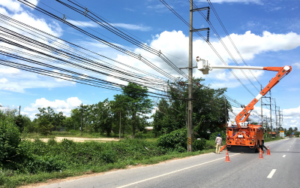
In the world of telecommunication, the efficient management of coaxial lines is crucial for seamless connectivity. To accomplish this, telecom companies often rely on the assistance of sub contractors. In Forth Worth, a major city in Texas, telecom sub contractors play a significant role in ensuring the smooth operation of coaxial lines and the overall efficiency of telecommunication services.
Understanding the Role of a Telecom Sub Contractor
Telecom sub contractors are an integral part of the industry, aiding in the construction, maintenance, and repair of coaxial lines. These professionals work closely with telecom companies to ensure that the infrastructure meets the required industry standards, thereby facilitating uninterrupted service to end users. The responsibilities of a telecom sub contractor are diverse and encompass various aspects of coaxial line management.
Key Responsibilities of a Telecom Sub Contractor
A telecom sub contractor’s primary responsibility is to assist in the installation and configuration of coaxial lines. This involves laying the groundwork for the network, running cables, and connecting them to the appropriate equipment. Sub contractors must possess a deep understanding of the technical specifications and guidelines provided by the telecom company they are working with.
Furthermore, telecom sub contractors are responsible for conducting routine inspections and maintenance checks on the coaxial lines. This ensures that the lines are in optimal condition, minimizing the risk of service interruptions. If any issues arise, sub contractors must troubleshoot and rectify them promptly, guaranteeing uninterrupted telecommunication services.
Required Skills and Qualifications
To excel as a telecom sub contractor, certain skills and qualifications are necessary. Firstly, a strong technical background in telecommunication and coaxial line management is essential. Sub contractors should possess knowledge of industry standards and best practices, and be adept at reading technical schematics.
Additionally, sub contractors should have excellent problem-solving abilities and be able to work under pressure. The nature of their job often requires quick thinking and efficient decision-making, minimizing downtime during repairs or upgrades.
Excellent communication and teamwork skills are also vital for effective collaboration with the telecom company. Sub contractors must be able to communicate effectively with team members and stakeholders, ensuring a smooth flow of information.
The Importance of Coaxial Lines in Telecommunication
Coaxial lines have played a pivotal role in telecommunications for several decades. These lines are used to transmit a wide range of signals, including internet data, television broadcast signals, and voice communications. Their reliability and versatility make them a fundamental component of telecommunication infrastructure.
The Functionality of Coaxial Lines
Coaxial lines function based on the principle of utilizing two conductors with varying levels of electrical charge. The inner conductor carries the signal, while the second conductor, separated by an insulating layer, acts as an electrical shield. This design prevents interference and signal degradation, ensuring efficient transmission of data.
Coaxial lines excel in transmitting high-frequency signals over long distances without significant loss. This makes them ideal for providing high-speed internet connections, supporting cable TV broadcasts, and facilitating reliable telephone services. Their robust design allows for greater signal bandwidth while minimizing the risk of data corruption.
The Evolution of Coaxial Cable Technology
Over time, coaxial cable technology has evolved to meet the demands of an ever-growing and evolving telecommunication industry. Advanced coaxial cables now have enhanced shielding capabilities, reducing signal interference and improving overall signal quality. Additionally, advancements in materials and manufacturing techniques have resulted in cables with improved durability and longevity.
Furthermore, the introduction of digital signal transmission has revolutionized the capabilities of coaxial lines. Digital signals offer higher data transfer rates and improved signal integrity, leading to superior audio and video quality for end users. The transition from analog to digital signals has been a game-changer in the telecommunication industry, with coaxial lines at the forefront of this transformation.
The Telecom Landscape in Forth Worth
Forth Worth is home to a vibrant telecom landscape, with numerous companies providing telecommunication services to businesses and residents alike. These telecom players invest billions of dollars in improving the city’s infrastructure, ensuring reliable and fast connectivity for Forth Worth’s growing population.
Major Telecom Players in Forth Worth
Several major telecom companies have a strong presence in Forth Worth. These include well-known industry giants such as AT&T, Verizon, and Comcast. These companies offer a wide range of services, including high-speed internet, television, and voice communication, catering to the diverse needs of Forth Worth’s population.
These telecom players are constantly investing in infrastructure upgrades to meet the city’s growing demands. They collaborate with sub contractors to ensure efficient project execution, complying with regulatory requirements, and delivering top-notch services to their customers.
The Impact of Telecom Infrastructure on Forth Worth’s Economy
The presence of robust telecom infrastructure has a significant impact on Forth Worth’s economy. Reliable telecommunication services are vital for businesses to thrive in the digital age. High-speed internet connections and advanced communication systems enable businesses to expand their reach, enhance productivity, and develop innovative products and services.
Furthermore, telecom infrastructure is a key factor in attracting new businesses and investments to the city. Forth Worth’s strong telecom infrastructure serves as an incentive for companies considering relocation or expansion, bolstering the local economy and creating job opportunities.
The Process of Sub Contracting in the Telecom Industry
Sub contracting plays a crucial role in the telecom industry, allowing companies to leverage specialized skills and resources while focusing on their core operations. When selecting a reliable sub contractor, telecom companies must carry out a thorough evaluation to ensure successful collaboration.
How to Choose a Reliable Sub Contractor
When choosing a sub contractor, telecom companies should consider several factors. Firstly, expertise and experience in coaxial line management are vital. The sub contractor should have a proven track record in executing similar projects and be familiar with industry best practices.
Furthermore, reliability and strong project management skills are essential. The sub contractor must demonstrate their ability to meet deadlines, effectively communicate progress, and handle unexpected challenges that may arise during the project. A robust project management system ensures smooth execution, minimizing potential disruptions.
The Legal Aspects of Sub Contracting
Sub contracting in the telecom industry involves legal considerations that both the telecom company and sub contractor must address. These can include agreements outlining the scope of work, terms and conditions, project deliverables, and confidentiality requirements. Clear communication and transparency regarding legal obligations help establish a strong foundation for a successful partnership.
Future Trends in Telecom and Coaxial Line Technology
The telecom industry is constantly evolving, driven by technological advancements and changing user demands. The future holds exciting prospects for both telecom and coaxial line technology, transforming the way we communicate and interact.
The Role of Fiber Optics in Future Telecom
Fiber optic technology is poised to play a significant role in the future of telecommunication. These thin strands of glass or plastic transmit data using light signals, enabling much faster data transfer rates than traditional copper cables. Fiber optics not only provide increased bandwidth but also offer superior signal quality and longer transmission distances.
With the rapid expansion of smart cities, the Internet of Things (IoT), and cloud computing, the demand for high-speed internet and data-intensive applications continues to grow. Fiber optic networks can meet these evolving needs, delivering faster and more reliable connectivity to homes and businesses.
The Impact of 5G on Coaxial Line Technology
The advent of 5G technology is set to revolutionize the telecommunication landscape. While 5G primarily relies on wireless communication, coaxial lines will continue to play a role in supporting and connecting the network infrastructure. Coaxial lines serve as a backbone for 5G cell towers, ensuring efficient data transfer between base stations and core networks.
Additionally, 5G’s increased data speeds and low latency will drive the demand for higher-capacity coaxial cables to support the traffic flow. The evolution of coaxial line technology will cater to the demands of 5G connectivity, further enhancing the overall performance of the network.
In conclusion, the role of telecom sub contractors in managing the coaxial line infrastructure cannot be overstated. Their knowledge, skills, and dedication are crucial in supporting seamless telecommunication services. As Forth Worth continues to thrive in the digital age, the telecom industry’s collaboration with reliable sub contractors and the advancements in coaxial line technology will continue to shape the city’s connectivity and contribute to its economic growth.
As Fort Worth’s digital landscape continues to evolve with the integration of 5G and the demand for robust coaxial line technology, Whitmore Construction stands ready to elevate your telecom infrastructure projects. With extensive experience in turn-key network services, our commitment to safety, quality, and customer service ensures your utility construction needs are met with precision and expertise. Whether it’s aerial or underground cable placement, power line construction, or comprehensive electric utility services, our seasoned teams are equipped to handle the complexities of today’s telecommunication challenges. Embrace the future with confidence by partnering with Whitmore Construction, where the successful implementation and ongoing integrity of your project is our foremost concern. Contact Us Today! to discover how our services can contribute to the growth and efficiency of your operations.
